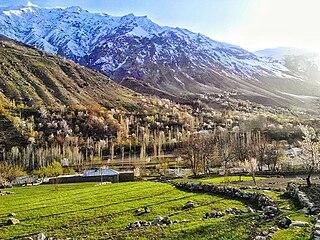Hindu Kush is a mountain range in Afghanistan and Pakistan.
Hindukush or Hindu Kush may also refer to:
- Hindukush (Jowzjan) a location in Jowzjan Province, northern Afghanistan
- Hindukush, Iran, a village in Karchambu-e Shomali Rural District, Iran
Hindu Kush is a mountain range in Afghanistan and Pakistan.
Hindukush or Hindu Kush may also refer to:

The Hindu Kush is an 800-kilometre-long (500 mi) mountain range on the Iranian Plateau in Central and South Asia to the west of the Himalayas. It stretches from central and eastern Afghanistan into northwestern Pakistan and far southeastern Tajikistan. The range forms the western section of the Hindu Kush Himalayan Region (HKH); to the north, near its northeastern end, the Hindu Kush buttresses the Pamir Mountains near the point where the borders of China, Pakistan and Afghanistan meet, after which it runs southwest through Pakistan and into Afghanistan near their border.
Baba and similar words may refer to:

The Nuristanis are an ethnic group native to the Nuristan Province of northeastern Afghanistan and Chitral District of northwestern Pakistan. Their languages comprise the Nuristani branch of Indo-Iranian languages.
Laghman can refer to:
The Kom or Kam are a Nuristani tribe in Afghanistan and Pakistan.
The Katir are a Nuristani tribe in Afghanistan and Pakistan.
Kush or Cush may refer to:
The 2005 Hindu Kush earthquake hit northeastern Afghanistan with a magnitude of 6.5 on December 12 at 21:47 (UTC). According to the United States Geological Survey, the maximum Mercalli intensity was V (Moderate) at Chitral. Five people were killed in the Hindu Kush region and landslides blocked several roads near Bagh, Kashmir. The earthquake occurred some 65 miles away from Faizabad, a city in the Hindu Kush mountains, but it could be felt in many neighboring areas. It could even be felt about 200 miles away in Islamabad, Pakistan. The quake was strong enough to trigger panic among survivors of October's devastating earthquake, who came out from their makeshift shelters in freezing temperatures. Although magnitude–6 earthquakes typically cause severe damage, this quake caused relatively little due to the fact that it occurred deep underground.
Kaffir or Kafir may refer to:

Mount Sikaram is a mountain on the Afghanistan–Pakistan border, south of the Kabul River and Khyber Pass. At 4,755 m (15,600 ft), it is the highest peak of the Spīn Ghar, or Safēd Kōh, mountain range.
Darzab may refer to:

The Kalash, or Kalasha, are an Indo-Aryan indigenous people residing in the Chitral District of the Khyber-Pakhtunkhwa province of Pakistan.
Yasin, Yassin, Yassine, Yacine, Yaseen, etc. may refer to:
Dashli may refer to several places in Iran:

Garam Chashma is one of the many branch valleys of Chitral District, situated in the extreme north-west of Pakistan. It is one of the highest human settlements in the Hindukush ranges with an altitude of almost 2550 meters. The place is known for its hot spring, which is one of the tourist attraction sites. It is also famous for its trout fish. The water flowing down through the length of the valley is famous for fishing sports. The Lotkoh River running down from the lofty peaks of the Hindu Kush is most suitable for the brown type of trout fish. Other features of the area include snow-covered peaks, pleasant weather, and natural springs, and more recently, has remained in the limelight for being a potential site of hydropower generation. Besides tourists, people suffering from skin diseases also visit the hot spring for treatment. It is located in the northwest of Chitral at a distance of about forty-eight kilometres by road. It shares international borders with Afghanistan being situated in the extreme northwest of Pakistan. Dorāh Pass connects this part of Pakistan with Badakhshan, the adjacent province of Afghanistan.
Koh-e Hindukush. It is a mountain of the Hindu Kush in Afghanistan. It is located in Parwan Province.
Takht-e-Soleiman, or variant spellings, may refer to:
Devon Koh-e Hindukush is a mountain of Hindu Kush in Parwan Province near Baghlan, Afghanistan.
Koh e Hindu is a mountain of the Hindu Kush in Afghanistan. It is located in near Shakardara District and Mir Bacha Kot District, Kabul Province.
Hindu Kush earthquake may refer to these earthquakes in the Hindu Kush mountains: